
Educating for Durable Solutions: Histories of Schooling in Kenya’s Dadaab and Kakuma Refugee Camps PDF
193 Pages·2021·1.487 MB·English
Most books are stored in the elastic cloud where traffic is expensive. For this reason, we have a limit on daily download.
Preview Educating for Durable Solutions: Histories of Schooling in Kenya’s Dadaab and Kakuma Refugee Camps
Description:
Educating for Durable Solutions considers the challenges of providing access to quality education for refugees trapped in protracted situations (PRS). Using United Nations High Commissioner for Refugees (UNHCR) archival documents and interviews with refugees, policymakers and program officers, Christine Monaghan reconstructs the contemporary education histories of two of the world’s largest refugee camps, Kenya’s Dadaab and Kakuma camps. Monaghan goes on to comparatively analyze changes to refugee education globally and in the camps and makes proposals for how the international community could tackle future emergency challenges. The research findings and proposals go against the grain of conventional thinking about refugee education by arguing that “the state” still matters.
See more
The list of books you might like
Most books are stored in the elastic cloud where traffic is expensive. For this reason, we have a limit on daily download.
